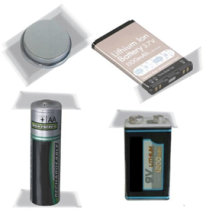Its best to avoid extreme temperatures since batteries can be reactive. Place your used lithium batteries in a pantry cabinet or closet.
 Proper Disposal Of Batteries Dpw
Proper Disposal Of Batteries Dpw
Do the drop test if you dont have a voltmeter.
How to throw out batteries. Because Australia doesnt currently have a recycling scheme for non-rechargeable batteries old batteries should not actually be disposed in your kerbside recycling bin or in your general waste bin. Batteries including single-use alkaline batteries use loads of different chemicals and materials such as lead cadmium zinc and lithium sometimes mercury too. Then you take the positive wire from the dual battery and quickly touch and remove it from the positive end of the batter you are charging.
Nearly half 47 per cent of those who throw batteries in the household trash say they do not know where to bring them. Prepping single-use batteries for recycling. Any rechargeable battery including lithium batteries or a cellphone battery that weighs up to 11 pounds and is under 300 watt hours is accepted.
Free up that space in the fridge next to the mustardjust put them in a. The people who work in these places are trained to handle and package the batteries to get them to the right place for proper recycling. Be careful not to touch your face or body with the leaked chemicals.
This works for AA AAA C and D batteries. Step 2 Scrub away as much of the white chalky buildup as possible with a cotton swab or an old toothbrush. Single-Use Batteries Single-use batteries are used in a variety of electronics and include alkaline carbon zinc mercuric-oxide silver-oxide zinc-air and lithium batteries.
Drop the battery straight down. Next you attach the negative wire from the dual batter you just made to the negative post of the battery you are trying to recharge. These can now be safe to be transported for incineration.
Many establishments Batteries comes to mind will make use of your used and unwanted batteries for free or for a low fee keeping them out of landfills and helping reduce their impact on the environment. Incineration is preferred over recycling most of the times because it is cheaper than recycling. You may be able to drop off alkaline batteries for recycling at a local electronics retailer recycling center or community center.
To debunk another battery-related myth. Similarly its best to keep the batteries dry. The best way to properly dispose of your lithium-ion batteries is to take them to your local recycling center or retailer.
In these cases the batteries must be recycled or dropped off at a designated facility. The batteries which have been used for commercial purposes should be discharged before they get disposed this means that the battery should have 2 volts or below. Cover your hands with protective latex gloves and remove the battery from the device.
And interestingly two in ten 23 per cent say they dont use enough batteries for proper disposal to matter. Your best bet is to take batteries to a disposalreclamation facility and that should be your first option. There are a couple ways you can properly dispose of the single-use and rechargeable batteries like AA AAA and D-cell batteries that are common in flashlights toys and other household.
Once you find a way to recycle your old batteries take a few minutes to prep your batteries for safe and convenient recycling. However that is not always possible and the last. Storing regular batteries in the fridge doesnt do much to extend their lives.
You can recycle rechargeable batteries free by placing them in Call2Recycle bins at the store. Donate Used Vape Batteries Disposing of an undamaged e-cig battery is as easy as tracking down your local battery store. Store the batteries in a cool dry place until disposal.
Check the Earth911 website for drop-off locations in your area. Place a piece of non-conductive clear tape over the ends to prevent any current transfer. Call your local solid waste district to find out if your community has a collection program or upcoming event.
Hold the battery about 12 inch 13 cm above a flat surface with the negative side facing down. Rechargeable batteries which can contain nickel or cadmium and automotive batteries which contain lead and acid should be kept out of the trash. Meanwhile four in ten 39 per cent were unaware batteries should not be thrown out.